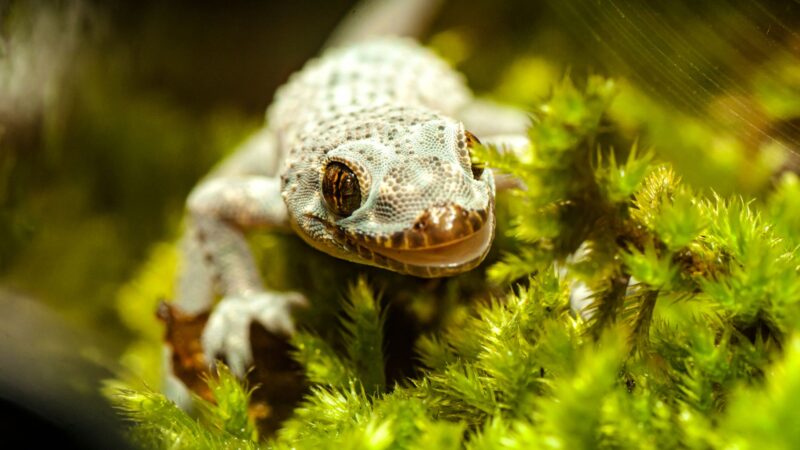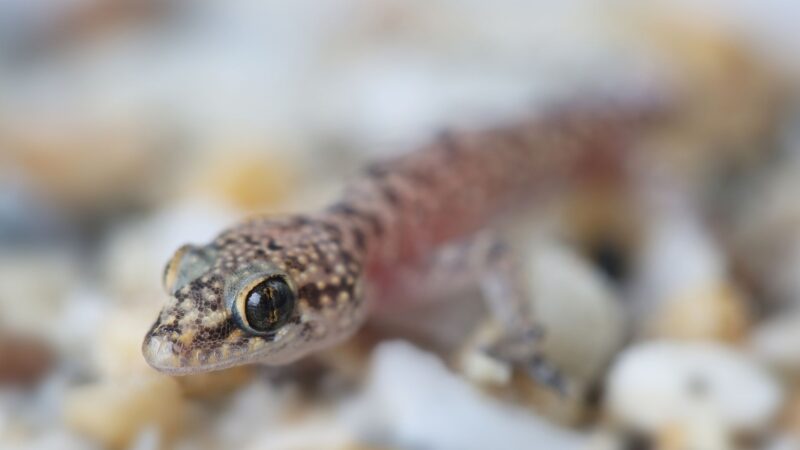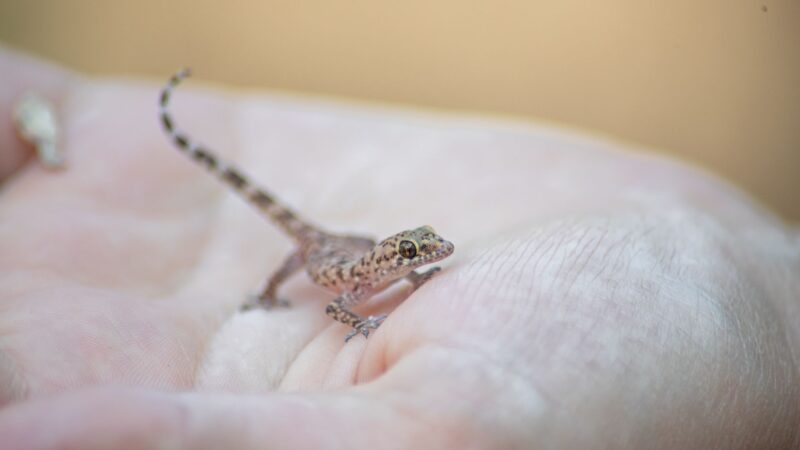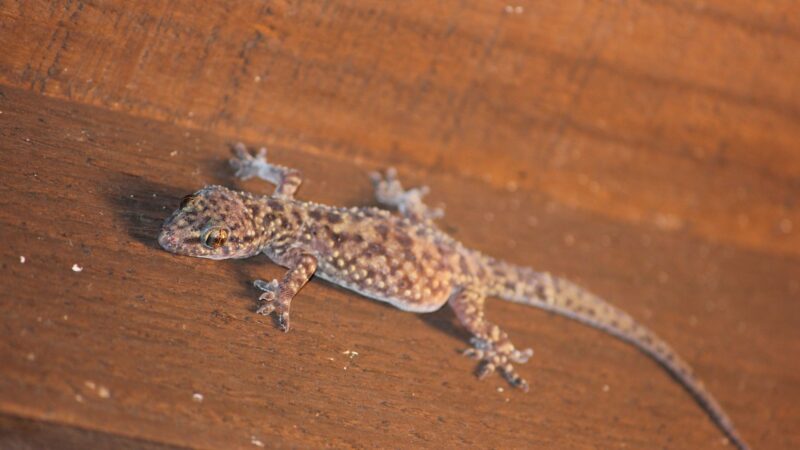Hearing the familiar chirps or seeing the unsightly fecal droppings of the Mediterranean house gecko may definitely take a toll on someone. Eliminating them is quite tricky but it can be done successfully with the right strategies!
So, how to get rid of Mediterranean house geckos? Seal any possible entry points, eliminate hiding spots, make your own DIY repellent, control insect populations, and reduce outdoor lighting.
Dive into the specifics by simply reading further this article!
Puzzled about geckos lurking around your home? Keep reading to get a complete understanding of these creatures, to identify signs of their presence, and to discover proven ways to keep them at bay.
What Is Mediterranean House Gecko?

Easily distinguished by its bumpy or warty skin, the light-colored Mediterranean house gecko (Hemidactylus turcicus) is a common species in Southern Europe and Northern Africa.
Like other geckos, They are nearly nocturnal and have sticky toe pads that help them climb walls and other structures. They are also characterized by their lidless eyes and vertical pupils.
What Does Mediterranean House Gecko Like?
Mediterranean house geckos are quite attracted to anything that gives off light and heat. This is why they can usually be seen near incandescent light bulbs in buildings or houses.
Doing so allows them to harness warmth into their bodies and forage for potential insect prey. Additionally, this behavior allows them more access to prey.
What Does Mediterranean House Gecko Eat?
They are primarily insectivores but they also consume spiders, other arthropods, and small crustaceans. Mediterranean house geckos are picky eaters, opting to choose live prey instead of dead ones.
Related: What Do Backyard Lizards Eat? | Information and Facts
Where Does Mediterranean House Gecko Live?
These geckos live in a variety of areas near humans. This includes terrestrial terrains, old and worn down buildings, shrublands, coastal regions, and even university campuses. In the wild, they prefer residing in inland cliffs, mountain peaks, and caves.
How Long Does Mediterranean House Gecko Live?
Mediterranean house geckos have a lifespan of 4 to 9 years old in the wild and up to 8 years in captivity.
How Big Will Mediterranean House Geckos Get?
Their snout to vent length ranges from 4.4 to 6 centimeters, depending on the sex. Moreover, their long tails can reach up to a whopping 15 centimeters.
What Is the Behavior of Mediterranean House Geckos?
Mediterranean house geckos are mostly nocturnal as they are mostly active from 10 PM until midnight. They tend to freeze or retreat when facing other individuals or species.
They also tend to show aggressive behaviors when their territories are threatened. Examples are jaw snapping, squeaking, tongue-flicking, and tail wagging.
Related: How to Get Rid of Alligators | Safety Measures and Removal Methods
Is The Mediterranean House Gecko Poisonous?
No, they are not poisonous. Hence, they are harmless to humans and pets.
Are Mediterranean House Geckos Dangerous?

No, they are relatively harmless. Although they tend to bite when feeling distressed or threatened, their bites are weak and will definitely not warrant any trips to your local health clinic.
Do Geckos Carry Disease?
On rare occasions, they may carry Salmonella bacteria which can cause Salmonellosis in humans and other animals. Geckos usually get this from the prey that they eat. One study suggests that they are mostly from cockroaches.
However, this shouldn’t be a cause for concern since the chances of getting infected by geckos are small.
Related: How to Get Rid of Cockroaches? | Proven Strategies & Solutions!
Why Are Mediterranean House Geckos Attracted to Your House?
Curious why you have a lot of Mediterranean house geckos out and about your house? Here are some reasons that can explain:
- Plenty of potential hiding spots
- Bright outdoor lights on the porch
- Abundance of insect prey indoors
Signs of Mediterranean House Geckos
Telltale signs of Mediterranean house geckos are frequent sightings around your home, fecal droppings (black pellets with white tips), and their unmistakable gecko calls.
Related: How to Get Rid of Brown Anole Lizards Naturally | Essential Tips!
How to Catch a Mediterranean House Gecko?

Catching house geckos may be tricky as they can be quick to avoid humans or may resort to biting if they feel threatened enough.
Use a plastic margarine container, small box, or any other suitable containers to catch them. Make sure to wear protective gear and gloves in case they have to be handled physically.
How to Get Rid of Mediterranean House Geckos?
Excluding them out of your property is the best proven method of getting rid of these pests since catching them may be physically difficult.
You may also follow these strategies to increase your chances of success:
- Identify gaps around the exterior of your house and seal these off using sealants, caulking, or other suitable materials.
- Reduce the swarm of insects you have both indoors and outdoors. Switch to a warmer outdoor light bulb. Use pesticides when necessary.
- Make DIY repellents such as liquid solutions of water, garlic, and onion to successfully deter geckos.
Related: How To Get Rid of Lizards in Your House and Around the Yard Without Killing Them
How to Prevent Geckos From Getting Into Your House?

Be on the lookout for possible Mediterranean house geckos lurking in your house. Once you see the obvious signs that they may be present, address the issue immediately.
Aside from that, eliminate as many hiding spots as possible, control insect populations, and reduce outdoor lighting.
Related: 9 Best Lizard Repellents That Actually Work | A Detailed Guide
List of Sources
Chan, J. G., Shero, C., Young, L., & Bareng, B. (n.d.). Salmonella in Two Gecko Species on the Island of Hawaii.
Iowa State University – Center for Food Security & Public Health. (2013). Salmonellosis Associated with Reptiles.
Merchant, M., & Brown, E. (n.d.). House geckos.
Smith, J. (n.d.). Hemidactylus turcicus: Mediterranean House Gecko.
Ugbomeh, D. (n.d.). Habitat use and food habitats of a gecko population in a west African suburban area.
- How to Get Rid of Copperheads | Practical Guide - August 27, 2023
- How to Get Rid of Corn Snakes | What Makes Them Aggressive? - August 27, 2023
- How to Get Rid of Alligators | Safety Measures and Removal Methods - July 16, 2023
